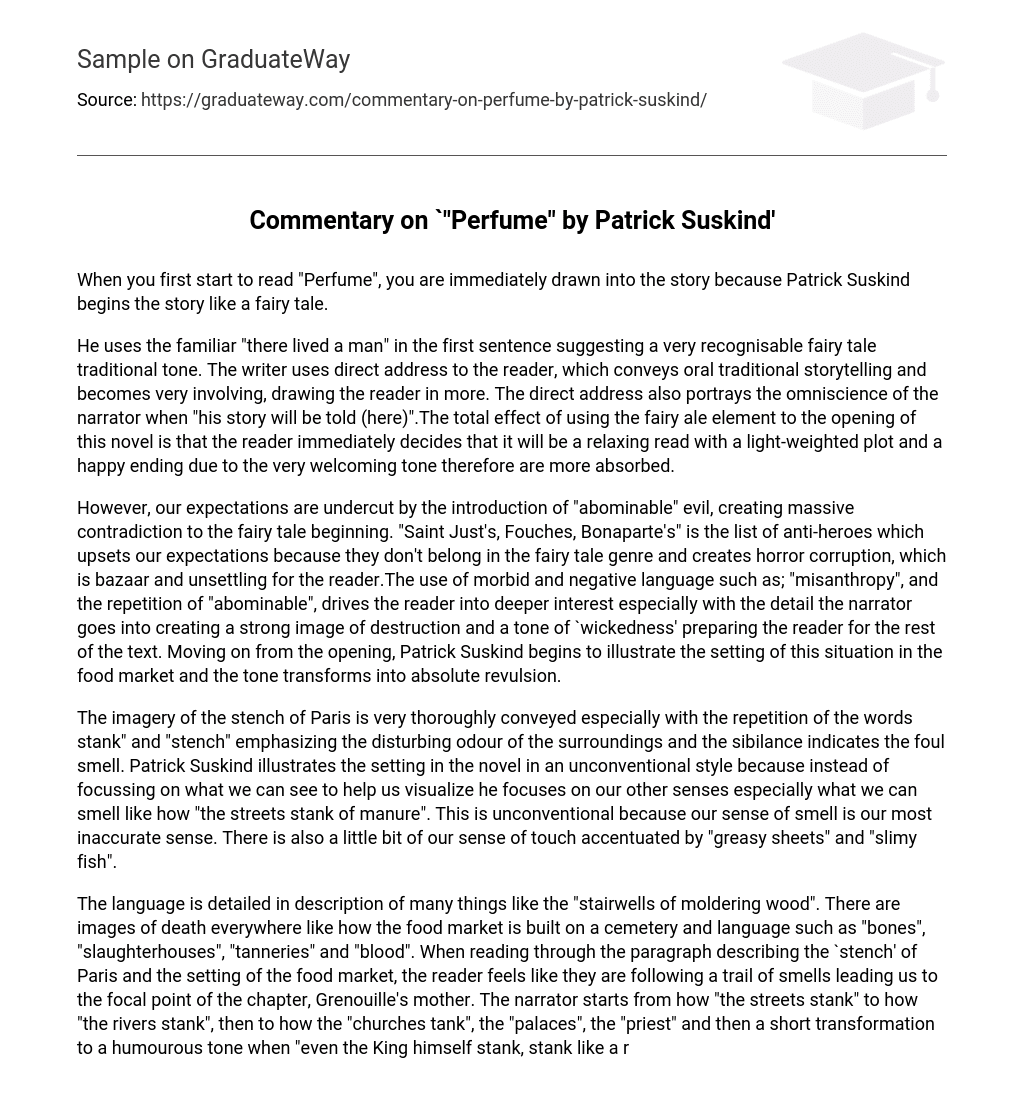When you first start to read “Perfume”, you are immediately drawn into the story because Patrick Suskind begins the story like a fairy tale.
He uses the familiar “there lived a man” in the first sentence suggesting a very recognisable fairy tale traditional tone. The writer uses direct address to the reader, which conveys oral traditional storytelling and becomes very involving, drawing the reader in more. The direct address also portrays the omniscience of the narrator when “his story will be told (here)”.The total effect of using the fairy ale element to the opening of this novel is that the reader immediately decides that it will be a relaxing read with a light-weighted plot and a happy ending due to the very welcoming tone therefore are more absorbed.
However, our expectations are undercut by the introduction of “abominable” evil, creating massive contradiction to the fairy tale beginning. “Saint Just’s, Fouches, Bonaparte’s” is the list of anti-heroes which upsets our expectations because they don’t belong in the fairy tale genre and creates horror corruption, which is bazaar and unsettling for the reader.The use of morbid and negative language such as; “misanthropy”, and the repetition of “abominable”, drives the reader into deeper interest especially with the detail the narrator goes into creating a strong image of destruction and a tone of `wickedness’ preparing the reader for the rest of the text. Moving on from the opening, Patrick Suskind begins to illustrate the setting of this situation in the food market and the tone transforms into absolute revulsion.
The imagery of the stench of Paris is very thoroughly conveyed especially with the repetition of the words stank” and “stench” emphasizing the disturbing odour of the surroundings and the sibilance indicates the foul smell. Patrick Suskind illustrates the setting in the novel in an unconventional style because instead of focussing on what we can see to help us visualize he focuses on our other senses especially what we can smell like how “the streets stank of manure”. This is unconventional because our sense of smell is our most inaccurate sense. There is also a little bit of our sense of touch accentuated by “greasy sheets” and “slimy fish”.
The language is detailed in description of many things like the “stairwells of moldering wood”. There are images of death everywhere like how the food market is built on a cemetery and language such as “bones”, “slaughterhouses”, “tanneries” and “blood”. When reading through the paragraph describing the `stench’ of Paris and the setting of the food market, the reader feels like they are following a trail of smells leading us to the focal point of the chapter, Grenouille’s mother. The narrator starts from how “the streets stank” to how “the rivers stank”, then to how the “churches tank”, the “palaces”, the “priest” and then a short transformation to a humourous tone when “even the King himself stank, stank like a rank lion, and the Queen like an old goat”.
Finally the narrator leads us to Grenouille’s mother whom is described as very `dull’ and of no importance even as a human being.Patrick Suskind uses irony describing Grenouille’s mother who “hoped to live” a while “had almost all her teeth” and “except for gout and syphilis…
. suffered from no serious disease”. This emphasizes how the people’s lives’ there reflect the “putrid” environment around them, lmost in a sense of pathetic fallacy but the other way around. As she is gutting fish in the market she experiences some labour pains but continues to gut the fish suggesting that she doesn’t care creating a very cold and heartless tone.
The imagery of a conventional childbirth is totally dismantled when and becomes a horrifying image of childbirth taking place “under the gutting table”. It is awful that a child has to be born into a life where his own mother thinks that the baby or “bloody meat” that she gave birth to “had not differed greatly from the fish guts”.This shows that Grenouille’s mother has no sense of morality or spirituality even during the birth. After Grenouille was born, no one wanted to care for him and he was of no importance like when the “prior was in a good mood.
.. they did not have the child shipped”. Grenouille was born into a cruel and pitiless atmosphere were the outcome of a human being’s life depended on one’s “mood” and he was just a “trouble” to be taken care of.
However, the tone changes slightly from horrific to religious when Grenouille gets accepted in the church almost as if he died and was reborn, giving hope.Already in this chapter, most readers can make assumptions on the rest of the novel because the smell, the way of life, society and poverty of Paris are all described as horrific, emotionless and abominable. All together they seem to be a big symbolic image and tone of how the rest of the novel will be like and what genre it will be. Readers already begin to suspect that Grenouille’s life won’t be very pleasant and when compared to the world he was born into, a world of corruption and cruelty, it is almost impossible for the reader to imagine Grenouille grow up to be a delightful, admirable man.





